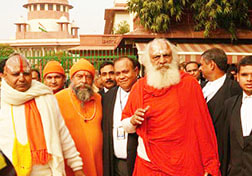
NEW DELHI: The emotive Ram Janmabhoomi-Babri Masjid dispute will be decided as any other land dispute based on evidence on record, the Supreme Court said on Thursday as it endeavoured to scale down passions and tensions generated by the 70-year-old conflict. A packed courtroom awaited Chief Justice Dipak Misra and Justices Ashok Bhushan and S Abdul Nazeer to assemble at 2 pm to hear the Ayodhya case. On December 5,

feverish arguments were raised by three advocates — Kapil Sibal, Dushyant Dave and Rajeev Dhavan — seeking adjournment of the case to July 2019, after the next general elections. Sibal and Dave were absent during Thursday's hearing.
To prevent passions from trumping legal arguments, the SC said, “Whatever be the case, it is after all a land dispute. There are appeals and crossappeals (against the Allahabad high court judgment on title suits). We will decide it as aland dispute taking into account the evidence on record and after hearing both sides.”
Pleadings not yet complete
What the bench appeared to be attempting was to divest the heated dispute over ownership of the 2.77 acre core site of political considerations by making it clear cases be settled on evidence and not a long history attached to them or inherent communal overtones. But the court found that despite its December 5 order, pleadings were not yet complete to allow the case to be ripe for commencement of hearing.
Appearing for lead petitioner M Siddiq, counsel Ejaz Maqbool, and counsel for Ram Lalla (idol), senior advocate C S Vaidyanathan, coordinated seamlessly over exchange of documents, English translations of extracts from books quoted in the suits and getting copies of two videos on the disputed site attached to the original records of the case brought from Allahabad HC. The SC asked the parties to complete the process in two weeks and posted the matter for hearing on March 14.
Siddiq's other counsel, Rajeev Dhavan, created a flutter at the end of a peaceful hearing by snubbing Vaidyanathan's suggestion for exchange of possible line of arguments by parties before the day-today hearing. He termed the case “important not only for India but the world”. Described as the “most important case of the last century”, a three-judge HC bench on September 30, 2010, had by two-to-one majority decided title suits and divided the site in three equal parts among Ram Lalla deity, Sunni Wakf Board and Nirmohi Akhara, while ruling that all three would be title holders.
To prevent passions from trumping legal arguments, the SC said, “Whatever be the case, it is after all a land dispute. There are appeals and crossappeals (against the Allahabad high court judgment on title suits). We will decide it as aland dispute taking into account the evidence on record and after hearing both sides.”
Pleadings not yet complete
What the bench appeared to be attempting was to divest the heated dispute over ownership of the 2.77 acre core site of political considerations by making it clear cases be settled on evidence and not a long history attached to them or inherent communal overtones. But the court found that despite its December 5 order, pleadings were not yet complete to allow the case to be ripe for commencement of hearing.
Appearing for lead petitioner M Siddiq, counsel Ejaz Maqbool, and counsel for Ram Lalla (idol), senior advocate C S Vaidyanathan, coordinated seamlessly over exchange of documents, English translations of extracts from books quoted in the suits and getting copies of two videos on the disputed site attached to the original records of the case brought from Allahabad HC. The SC asked the parties to complete the process in two weeks and posted the matter for hearing on March 14.
Siddiq's other counsel, Rajeev Dhavan, created a flutter at the end of a peaceful hearing by snubbing Vaidyanathan's suggestion for exchange of possible line of arguments by parties before the day-today hearing. He termed the case “important not only for India but the world”. Described as the “most important case of the last century”, a three-judge HC bench on September 30, 2010, had by two-to-one majority decided title suits and divided the site in three equal parts among Ram Lalla deity, Sunni Wakf Board and Nirmohi Akhara, while ruling that all three would be title holders.

 RSS Feed
RSS Feed
